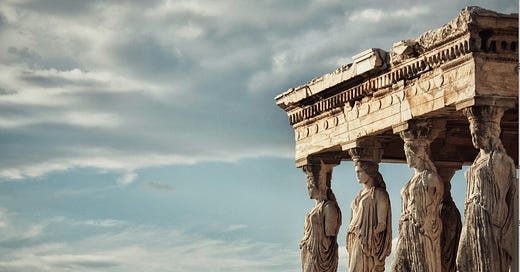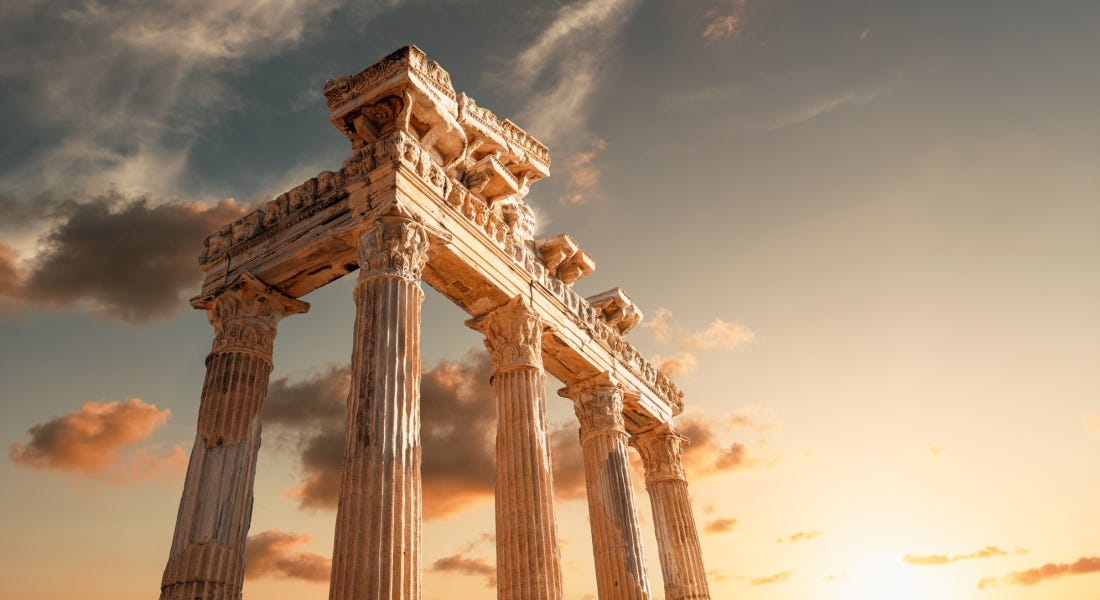Revisiting Plato and the Oldest Recorded Near-Death Experience
A look back at one of our first posts . . .
Originally published May 17, 2023
Plato and the Myth of Er
In college I had a fantastic philosophy professor named Mr. McCarthy. He was a legend on campus. Despite his shock of white hair and glasses so thick his eyes looked like they were staring out at you from under a microscope, he was as smart as a whip. He also had an Irish charm that was undeniable.
I will never forget taking his Introduction to Philosophy 101 course. He was famous for getting so riled up and passionate about ancient Greek philosophy that he would start to shout, hop, and dance around the room, scribbling barely legible words across the blackboard. Those of us in the front rows were horrified to discover that in his frenzy, spittle would fly out in all directions. There was no safety unless one was several rows back, so over time I noticed the front rows remained empty.
I will always remember a lecture in which he managed to jump onto his desk as his talk reached a crescendo, despite being in his late sixties and having recently had knee surgery. Did his surgeon know what he was up to in the classroom? I found myself wondering. But he simply couldn’t help it. To us bewildered freshmen in college who hadn’t thought too deeply about the meaning of life, Mr. McCarthy resembled a grandfather whose coordination had waned but whose passion for ancient philosophy had only gained steam over the years.
He was successful, with me at least, at transmitting a passion and fascination for ancient philosophy, which included a reverence for Plato in particular. Imagine my wonder to discover over twenty years later that at the end of Plato’s most famous book, The Republic (written around 375 BCE and widely considered the most influential and enduring philosophical treatise in the Western canon), is the first ever recorded account of a near-death experience. It makes me smile to myself even now.
I still have my copy of The Republic, chock-full of illegible notes from that first freshman course with Mr. McCarthy.
First Recorded NDE in History
At the end of The Republic the central character, Socrates, shares a story that he describes as a legend, or myth. My belief is that even 2,400 years ago, many people were skeptical about the existence of the soul and the afterlife. Because of this, I think Socrates chose not to present his ideas as indisputable facts. However, many scholars believe that the fact that Plato ends the entire book with this “myth” indicates without a doubt that he felt it to be important and therefore believed in its reality.
In many ways, Plato’s Myth of Er is an important historical document because it is remarkably similar to modern descriptions of near-death experiences (NDEs). Er describes feeling a sense of detachment from his physical body, seeing a bright light, and encountering spiritual beings. He also describes a sense of peace and well-being that he experienced while in the afterlife, as well as describing intricate details of the process of reincarnation that souls undergo after life on Earth.
Why does this matter?
Because if NDEs are a real and legitimate phenomenon, one would expect stories of them to be found across cultures and civilizations, and throughout history. The presence of a recorded NDE at the very end of The Republic, one of the most famous and enduring philosophical texts in Western civilization, is highly significant. In fact, it provides compelling historical support for the study of NDEs in the modern world.
There are many other instances of recorded experiences of NDEs in other cultures in different parts of the world throughout history. This is but one example.
Our founding belief at Coming Home is that the studies of NDEs and the integration of their messages can lead to profound healing and benefit to the modern world. I look forward to exploring more stories of near-death experiences found across cultures and throughout history, both here and on our YouTube channel.
Now, on with the story.
Who Was Plato?
First, a few words on Plato and Socrates before we talk about the Myth of Er.
Plato was a Greek philosopher who often wrote about his teacher, a philosopher and mystic named Socrates. It turns out that Socrates was not some old, stuffy intellectual philosopher; this is a common misperception. Rather, he was a lively and mischievous mystic, an awakened sage (like those in India or elsewhere in Asia) who was regarded in ancient times as an initiate of the mysteries. He knew about the secrets of the soul, the afterlife, and of the many spiritual worlds based on direct experience, not intellectual knowledge.
Socrates passed this esoteric knowledge down to his students and disciples but did so in provocative ways, which upset the authorities in ancient Athens. He would have public debates, challenging how people thought about the world. He would inspire many with his admonishments to focus on one’s soul and to abandon the folly of living a life focused on the short-term pleasures of the body and the ego (i.e., the focus on food, wine, money, and fame).
Socrates eventually became the focus of much of Athenian ire, especially from those in power. He was perceived to be a threat to society by inciting unrest and “curdling the Athenian youth,” a common misperception that he was drawing too many young men and women away from useful careers and into the spiritual practices of philosophy. He was eventually sentenced to death by drinking hemlock poison.
Plato carried on the tradition started by his teacher Socrates and went on to write many profound books on philosophy and the soul. Plato’s philosophy is widely considered to be the cornerstone of Western civilization and all subsequent studies of philosophy and even theology (as Plato’s metaphysics was later integrated into the Christian theology of the Church Fathers). Plato’s own student, Aristotle, went on to become one of the founding and originating thinkers of not only philosophy but also natural science, mathematics, and astronomy.
The Myth of Er
With this background of Socrates and Plato in mind, let’s turn to the Myth of Er itself.
At the very end of The Republic, Socrates tells the story of a man named Er, a soldier from the Greek city Pamphylia, who died on the battlefield. After twelve days, his body was collected along with others and was laid on the funeral pyre for cremation—when, all of a sudden, he comes back to life!
Er shares his journey through the afterlife to his astonished audience.
According to Er, after his death he found himself standing in a great plain and seeing two portal-like tunnels coming down from heavenly spheres above, and two portal-like tunnels coming up from the ground below, from which souls were emerging from hell realms below. From these tunnel openings, Er could see souls coming and going. The souls coming down from above were clean, Socrates recounts, like people who were emerging fresh from a bath. They had smiles and joyful expressions as they told of the incredible beauty and unimaginable bliss of their travel in the higher spheres. Those coming out of the tunnels from below, however, looked traumatized and terrified, with gaunt faces and fearful eyes. They recounted with horror the terrible sufferings and unspeakable nightmares they had endured in the realms “below.”
The Judges who sat at this crossroads between realms told Er he was to observe carefully what he was witnessing and that he was to go back home to share these great mysteries with his fellow humans down on Earth. The Judges explained that the men and women were sent up above to the heavenly spheres or down below to the hell realms based on their actions and behavior during their lives on Earth. They said that one’s actions on Earth were magnified tenfold in the afterlife: the acts of violence and harm are magnified tenfold and they must therefore pay the karmic debt below ground for a certain amount of time, or likewise any acts of kindness and love were magnified tenfold and those people were sent above into the heavenly realms.
After seven days in this great field, Er is taken on a four-day journey to a new land filled with rainbow light brighter than any light he had ever seen before. There he saw three goddesses giving a long line of souls a choice of a new life to live on Earth. Each soul was asked what kind of life they would desire to live for their next life. Er describes how some people who had recently come down from the heavenly spheres were in a relaxed and confident state and chose to return to Earth as a dictator or powerful politician.
This, Er explained, was a grave mistake, as greedy politicians or dictators can accrue the worst forms of karma by causing extensive suffering due to magnified levels of power and influence. A certain man who had chosen this life, with apparent greed for influence and power, had evidently lost sight of the importance of virtues such as humility and kindness. Only after receiving his lottery ticket (his life assignment) did he realize too late the unfortunate error of his hasty decision.
Another soul approached the Goddess Necessity, and having recently returned from the hell realms below, requested a life of simplicity, kindness, and service. Evidently those who suffered below had been chastened and learned to choose lives in which they could cultivate the virtue of selflessness. Many others, he said, chose similar lives they had already lived, not out of any wisdom or insight, but out of habit and lethargy.
After choosing their new lives, each soul was assigned a guardian spirit (an angel) to accompany them throughout their human sojourn. They were then led to the River of Forgetfulness, where they drank water that made them forget their experience in the afterlife. Once they fell asleep, they were pulled down into Earth to be born as a child, with no memory of how they came to be there. After witnessing all of this for many days, Er was then sent back to Earth with the order to tell his fellow men and women what he had seen and witnessed.
Conclusion
The Myth of Er has an incredible number of similarities with modern NDEs. It is a fascinating early historical account of a classic NDE. From seeing the light and feeling the peace to being shown the mysteries of souls as they traverse the realms of the afterlife, Plato delivers a powerful statement on the survival of life after death.
One way the Myth of Er aligns with many traditional NDE testimonies is in how it emphasizes the importance of living a virtuous life and making good choices, as these will determine the ultimate fate of the soul. It is also one of the earliest teachings of reincarnation, a common feature of ancient Greek metaphysics, in which souls learn from one life to the next how best to cultivate good character traits. By being punished or rewarded for their deeds in previous lives, souls eventually learn to cultivate morality and ethics—in particular, kindness, forgiveness, compassion, and selfless service to others.
This myth is of course contextualized by the culture of ancient Greece, but even more so by the teachings and philosophy of Socrates and his disciple Plato. Plato’s philosophy was oriented toward helping men and women focus on cultivating a healthy soul rather than focusing on the body and its short-term pleasures. A healthy soul leads to a life of virtue and kindness, a life of correct understanding and moral living, so that after death, they might gravitate to the heavenly spheres to continue their journey.
This is, of course, what we see in the NDEs of many other traditions and cultures, as well as in the larger themes of most organized Axial Age religions around the world. Most religious traditions emphasize the importance of cultivating the soul and resisting the temptations of the body and the ego, which are cast as obstacles that can derail one from growing their spiritual perceptions.
This then finishes our dive into Plato’s story of Er, the first recorded NDE in written history. At Coming Home, we believe these stories of people who have died and then come back to tell us what they’ve seen on the other side can have a tremendous impact on our lives and how we think about life. They often lead us to question things, to feel hope, wonder, and awe at this great mystery we find ourselves in.
We hope this story has contributed to that sense of wonder. Explore more stories of Near Death Experiences on our YouTube channel.










It’s all starting to have synchronization with academia in discoveries that have been happening over the last few decades but dare to be spoken about in our higher education system. Complete failure. I have had to unF**k myself and all my foundational beliefs. I am sure I will figure it out then die. That’s how wisdom works. I don’t actually ever use the F word in life because I do believe in the energetic affect of words, but it’s my best way to describe my own experience 👀